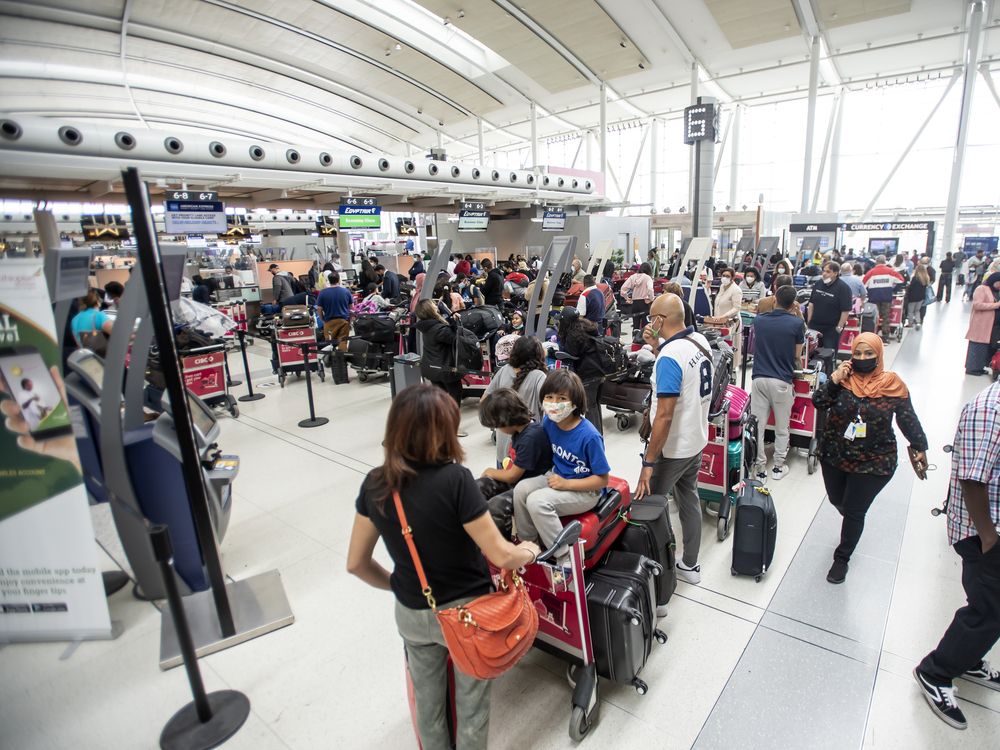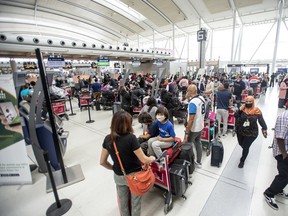Canada temporarily lifting random COVID testing amid massive bottlenecks at airports

Pausing tests at airports for vaccinated travellers until June 30, starting Saturday

Article content
The federal government is pausing random COVID-19 tests at airports for vaccinated travellers until June 30, starting Saturday.
Advertisement 2
Story continues below
Article content
Unvaccinated travellers will still be subject to testing at airports, but the government plans to move it offsite in July.
The news comes after the group that represents Canadian airports called on the federal government to lift the last vestiges of its pandemic travel requirements on news the United States will remove its pre-departure testing mandates.
U.S. President Joe Biden’s administration will cease requiring COVID-19 tests before flights for all air travellers flying to the U.S. on June 12 at 12:01. a.m, The Wall Street Journal reported. Canada should follow suit, the Canadian Airports Council said after the report.
“This is very welcome news and I think it speaks to a growing global consensus to lift testing mandates for travel,” Monette Pasher, the council’s interim president, said. “Canada no longer needs to be checking and vetting travellers on arrival into our country at our airports.”
Advertisement 3
Story continues below
Article content
In April, the Canadian government removed a mandate that required all inbound travellers to provide a negative COVID-19 test before flying into the country, switching to random testing of arriving passengers instead.
Despite the change, airports and airlines continue to deal with massive passenger bottlenecks and service disruptions due to overwhelming demand. Pasher said random mandatory testing only increases delays. Add on severe labour shortages for security and border control checkpoints, and the situation has festered.
Travellers are waiting hours to have carry-on baggage checked or when trying to collect luggage, according to some reports. And due to inadequate staffing at the terminals, planes have sometimes had to wait just as long on the tarmac before allowing passengers to disembark.
Advertisement 4
Story continues below
Article content
At Toronto Pearson International Airport, Air Canada cancelled nine per cent of its scheduled flights between June 1 and June 9, the Canadian Press reported.
“(Delays) can have knock-on effects not only for our customers but can also impact our employee resources and operations,” Peter Fitzpatrick, an Air Canada spokesperson, said in an emailed statement.
“For example, if an aircraft is held at a gate longer than expected or a flight is suddenly forced to cancel, that can affect the schedules of crews and the ground staff servicing the aircraft, disrupting subsequent flights.”
Pearson is the country’s busiest airport, handling more than 30,000 international passengers a day, Pasher said. In comparison, Montréal-Trudeau International Airport handles 15,000 on average.
Advertisement 5
Story continues below
Article content
Bottlenecks at Pearson last month meant nearly half a million passengers aboard international flights faced delays, compared to a few hundred passengers in May 2019, the Greater Toronto Airports Authority said.
-

JetBlue launches service to Canada with daily flights between Vancouver and JFK
-

Air Transat loses $112 million in the second quarter: What you need to know
-

Long waits on the plane await travellers as airports work out the kinks
-

Toronto Pearson travellers face long waits as airport hit by double whammy of COVID screening and staff shortages
WestJet Airlines Ltd. spokesperson Madison Kruger said the airline had “proactively cancelled a small percentage” of flights at Toronto Pearson this week, but did not clarify exactly how many.
Advertisement 6
Story continues below
Article content
The company is “extremely concerned” with the “unacceptable” situation at airports and is urging changes, she said in an emailed statement. “Additionally, we continue to advocate for the removal of legacy pandemic measures.”
If Canada were to remove all travel requirements, it would fall in line with countries such as Spain, Italy and Israel, jurisdictions that at one time had some of the most severe requirements for entry.
“That’s where we’re seeing the biggest amount of lineups,” Pasher said. “(It) is on entry to the country. This is the piece that requires more action.”
• Email: bbharti@postmedia.com | Twitter: biancabharti
Advertisement
Story continues below









